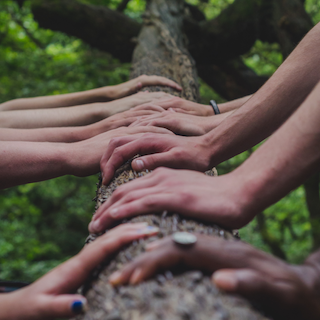Stewardship
The final value of the Quaker SPICES is “stewardship.”
Growing up attending church, I heard quite a bit of teaching about stewardship. In that context, the term usually meant giving a certain percentage of my income to the church I attended so it could fulfil its mission. Because I had a mostly positive early experience of church, I bought in without much resistance. Like so many of my early understandings of spiritual principles, it turned out to be a good starting place. By giving away a percentage of my income to charitable causes from an early age, I learned to care about the needs that existed in the world. I also learned something about managing money. Overall, it served me well.
Over time, I learned that stewardship applied to more than just money. Stewardship extended to other resources. For example, I learned to steward the Earth’s natural resources. As a kid, I spent much time in the outdoors, hiking and camping. One of the values I was taught was to leave every campsite better than I found it by picking up trash, ensuring campfires were extinguished, and taking care that my activities did not harm any wildlife. All of that has also served me well. Today I would never dream of throwing trash out of a car window, or dumping hazardous waste into the ground.
But like so many of the values discussed in this series of articles, over time I would come to a broader understanding of stewardship. I would have to grow before I could see it. I owe the learning to a few mentors along the way who demonstrated a larger form of stewardship. A particularly difficult season of life also helped change my perspective.
My transformation is leading me to see life through the lens of abundance and generosity rather than through the lens of scarcity and stinginess.
I used to see life in terms of limited resources. Every decision was about conserving as much as I could and being as efficient as I could be with what I had. Of course, it was not a bad place to start as far as stewardship is concerned. It kept me from wasting what I had. I was responsible with my money. I took care of my possessions. I even gave away just enough to fulfill my moral obligations.
But I was not really generous. I did not fully use what I had to contribute to the greater good. I was anxious about whether I would have everything I needed in the future. I sometimes ignored the needs of those closest to me because I was so worried about preserving what I already had. People could sense that I was holding on tightly to what I thought was mine.
Now I am beginning to see life in terms of abundance. There is more than enough of everything I need. This applies to material needs such as food, clothing, and shelter. But it also applies to the greater needs of love, affirmation, and security. As I am learning to relax and trust that there is enough of everything I need, I find myself holding on to what I have more loosely. Slowly but surely, I am becoming generous beyond what is required to meet my sense of moral obligation. Gradually I am learning to share everything with an eye to really caring about those around me, both loved ones and strangers.
Reality appears more and more like an abundant stream originating from another source. I can join the flow, and allow all things that come freely to me to flow through me and on to others. I no longer get lost in preserving my small section of the river at the expense of those downstream. Building dams no longer seems necessary. I trust the flow will continue to come from its source upstream.
Stewardship now means I can use that which I truly need, knowing more will be there as I need it. At the same time I can be respectful of the river, avoid polluting it, refrain from damming it up, all so that it may richly provide for others as well.
Your eye is the lamp of your body. When your eyes are healthy (“generous”), your whole body is full of light. But when they are unhealthy (“stingy”), your body also is full of darkness. See to it then that the light within you is not darkness.
